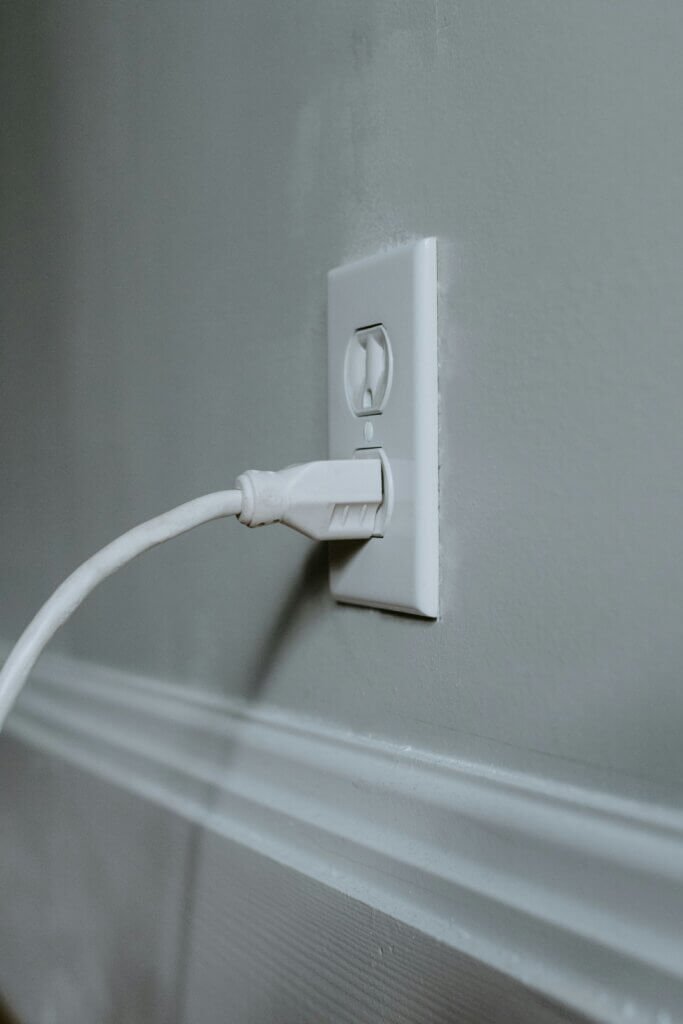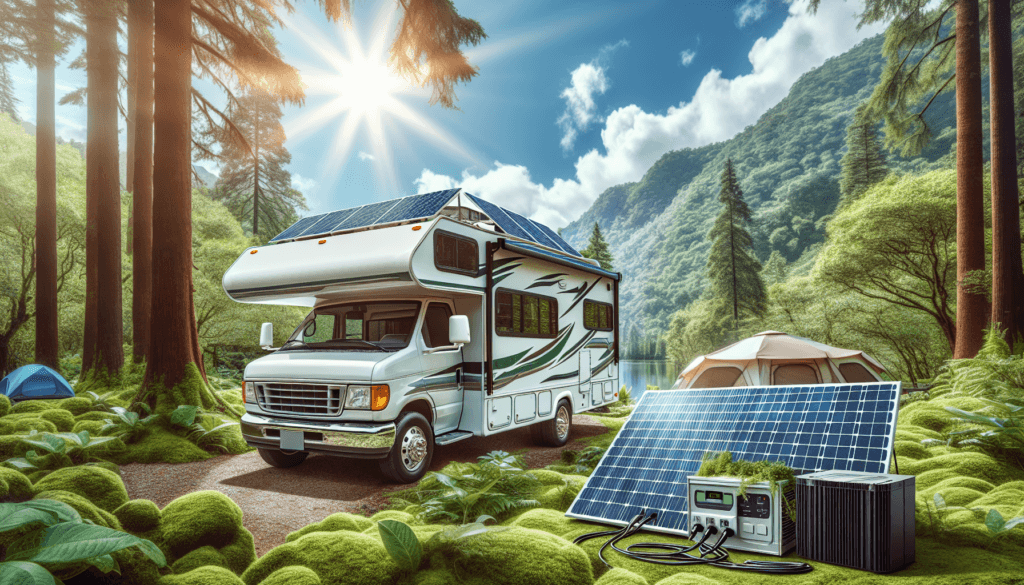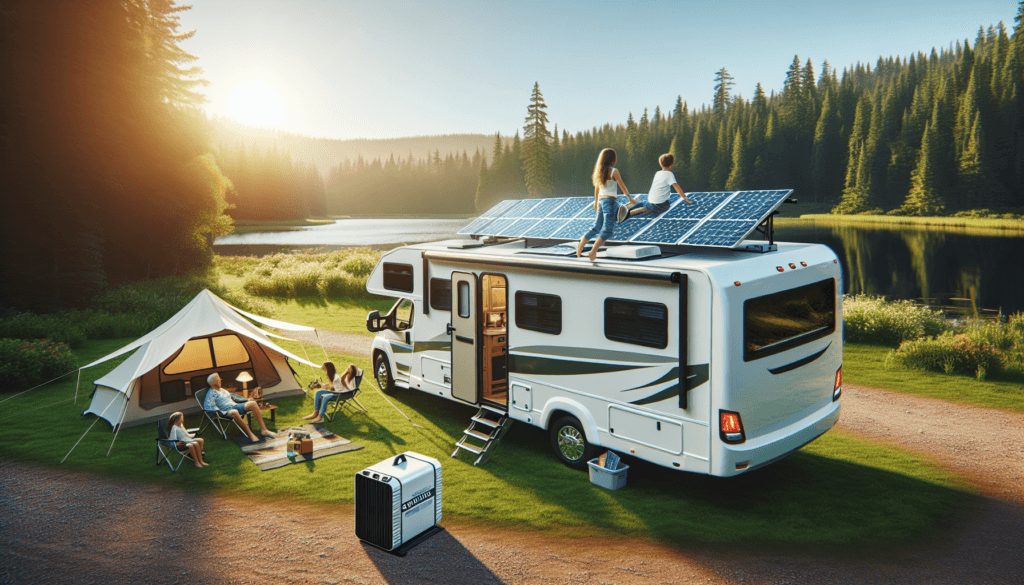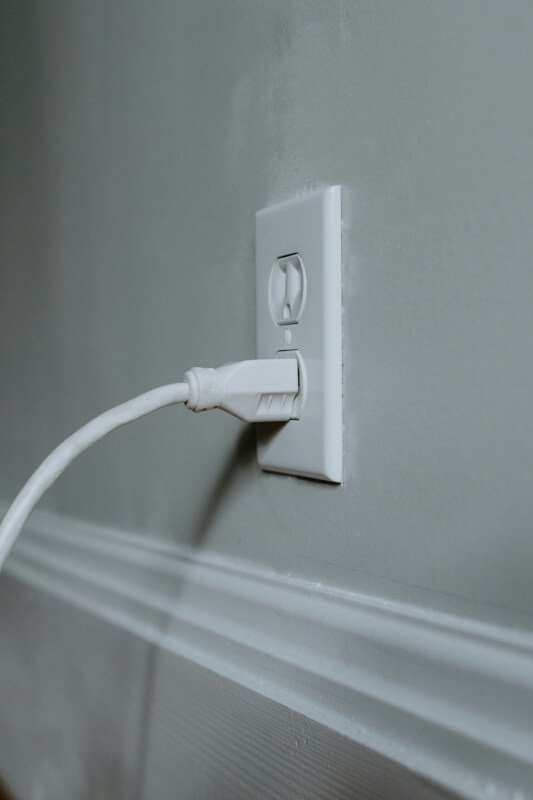Imagine the freedom of RV camping without worrying about electricity. With the RV Camping Solar Inverter, you can harness the power of the sun to meet all your energy needs on the road. Whether you’re running appliances, charging devices, or simply enjoying a quiet night with the lights on, this solar inverter is your ultimate companion. Say goodbye to noisy generators and hello to sustainable, clean energy. It’s time to hit the road and embrace the power of the sun with the RV Camping Solar Inverter.
What is an RV camping solar inverter?
Definition and function
An RV camping solar inverter is a device that converts the direct current (DC) power generated by solar panels into alternating current (AC) power, which can be used to power various appliances and devices in an RV. It serves as a crucial component of an RV solar power system, allowing campers to harness the sun’s energy and use it to power their electrical needs while enjoying the great outdoors.
Types of RV camping solar inverters
There are two main types of RV camping solar inverters: modified sine wave inverters and pure sine wave inverters. Modified sine wave inverters are more affordable but may produce a distorted waveform, which could potentially harm sensitive electronics. On the other hand, pure sine wave inverters provide a clean and consistent power output, making them suitable for all types of devices and appliances.
Choosing the right RV camping solar inverter
Determining power needs
Before selecting an RV camping solar inverter, it is essential to calculate your power requirements. Consider the wattage of all the appliances and devices you plan to power with solar energy. Add up the individual wattage values to determine the total power consumption. This will help you choose an inverter that can handle your RV’s electrical needs effectively.
Considerations for RV system compatibility
When choosing an RV camping solar inverter, it is crucial to consider the compatibility with your existing RV electrical system. Check the voltage and current ratings of your RV’s electrical system, and ensure that the inverter you choose aligns with these specifications. Additionally, consider the capacity of your RV’s battery bank to ensure it can provide sufficient power to the inverter.
Sizing requirements for the inverter
Inverter sizing is an important consideration when choosing an RV camping solar inverter. Determine the surge power and continuous power requirements for your appliances and devices. The surge power refers to the initial power needed to start an appliance, while continuous power refers to the power required to run the appliance continuously. Select an inverter that can handle the surge power without becoming overloaded.
Selecting the appropriate type of inverter
Consider the type of appliances and devices you plan to power in your RV. If you have sensitive electronics, such as laptops or medical equipment, it is advisable to choose a pure sine wave inverter to prevent potential damage. However, if your power needs are minimal and you are on a budget, a modified sine wave inverter may suffice. Carefully evaluate your requirements and choose the type of inverter that best suits your needs and budget.

Understanding solar power generation
Solar panels and their components
Solar panels are crucial components of an RV camping solar power system. They consist of several interconnected photovoltaic cells that convert sunlight into electrical energy. These cells are typically made of silicon, which allows them to absorb photons from sunlight and create a flow of electrons, generating a direct current.
How solar panels convert sunlight into electricity
When sunlight hits the solar panels, the photons present in the sunlight knock the electrons loose from their atoms. This creates a flow of electrons, generating a direct current (DC). However, most RV appliances and devices operate on alternating current (AC). This is where the RV camping solar inverter comes into play, converting the DC power produced by the solar panels into AC power suitable for powering RV appliances.
Factors affecting solar power generation
Several factors can impact the efficiency and overall power generation of RV solar panels. These factors include the angle and orientation of the panels, the amount of sunlight received, temperature, shading, and the cleanliness of the panels. To maximize solar power generation, it is important to ensure proper panel placement, regular cleaning, and maintenance.
How does an RV camping solar inverter work?
Inverter basics and functionality
An RV camping solar inverter works by converting the DC power produced by the solar panels into AC power. It serves as the heart of the solar power system and ensures compatibility with the RV’s electrical system. The inverter receives the DC power from the solar panels, processes it, and converts it into AC power that can be used to power appliances and devices within the RV.
Converting DC power to AC power
The RV camping solar inverter uses a complex electronic circuitry to convert the DC power from the solar panels to AC power. The circuitry includes transformers, capacitors, and switches that help regulate the voltage, frequency, and waveform of the power output. This conversion process allows for seamless integration with the RV’s electrical system, enabling the use of AC-powered devices.
Importance of a pure sine wave inverter
A pure sine wave inverter is vital for ensuring the smooth and reliable operation of RV appliances and devices. Many modern electronics and appliances, such as laptops, televisions, refrigerators, and air conditioners, require a clean and consistent AC power supply. A pure sine wave inverter produces a high-quality waveform that mimics the power provided by the utility grid, guaranteeing the safe operation of sensitive electronics.
Integration with RV battery system
An RV camping solar inverter is typically connected to the RV’s battery system. The solar panels generate DC power, which is stored in the batteries. The inverter then converts this stored DC power into AC power for immediate use or for recharging other batteries. This integration allows for efficient power management and ensures a constant supply of electricity for all your camping needs.

Benefits of using solar power for RV camping
Reduced dependence on traditional power sources
By utilizing an RV camping solar inverter, you can significantly reduce your reliance on traditional power sources, such as generators or external electrical hook-ups. This not only saves on fuel costs but also provides a more sustainable and eco-friendly alternative for powering your RV. With solar power, you can enjoy the freedom of off-grid camping and explore remote locations without worrying about access to electricity.
Environmental sustainability
Solar power is a renewable and clean source of energy. By using solar power for RV camping, you contribute to reducing carbon emissions and your overall environmental impact. Solar panels produce electricity without releasing harmful pollutants, making them an environmentally friendly choice for powering your RV.
Noise-free and pollution-free operation
Compared to traditional power sources, such as generators, solar power offers a noise-free and pollution-free operation. Generators can be loud and emit exhaust fumes, which can disrupt the tranquility of your camping experience and harm the environment. Solar power allows you to enjoy a peaceful camping environment without any noise or emissions.
Installation and setup of an RV camping solar inverter
Choosing suitable mounting options for solar panels
Proper positioning of solar panels is crucial for maximizing solar power generation. When installing solar panels on an RV, consider mounting options such as roof mounts, ground mounts, or portable setups. Roof mounts are a popular choice as they utilize the available rooftop space efficiently. Ground mounts and portable setups offer flexibility and allow for adjustments based on sunlight availability.
Proper wiring and connection of solar panels
Ensure proper wiring and connection of solar panels to the RV camping solar inverter. Follow the manufacturer’s instructions carefully and use appropriate cable sizes for minimizing power loss. Use reliable connectors and make sure all connections are secured and protected against the elements. Check for any shading or obstructions that may affect the efficiency of the solar panels.
Securing the inverter and battery system
Secure the RV camping solar inverter and battery system in a suitable location within the RV. Choose a well-ventilated area that allows for proper airflow and minimizes the risk of overheating. Secure the inverter and the batteries using brackets or mounting systems to prevent movement during travel. Ensure that all connections are properly tightened and insulated to avoid any potential hazards.
Safety precautions during installation
When installing an RV camping solar inverter, it is crucial to prioritize safety. Turn off all power sources and disconnect the RV’s electrical system before beginning the installation process. Take necessary precautions when working with electrical components and follow all safety guidelines outlined by the manufacturer. If you are unsure about any aspect of the installation process, consult a professional for assistance.

Maintenance and troubleshooting of RV camping solar inverters
Regular cleaning and inspection of solar panels
Regularly clean your RV solar panels to ensure optimal performance. Remove any dirt, dust, or debris that may accumulate on the surface of the panels. Inspect the panels for any signs of damage, such as cracks, hotspots, or broken connections. Clean panels can maximize solar power generation and prevent any potential issues that may arise from dirt or debris build-up.
Battery maintenance and monitoring
Proper battery maintenance is essential for the longevity and performance of an RV camping solar inverter. Regularly check the battery’s state of charge and voltage levels. Follow the manufacturer’s recommendations for battery maintenance, including checking fluid levels, monitoring for signs of corrosion, and ensuring proper ventilation. Implement a regular battery maintenance schedule to extend the lifespan of your batteries.
Identifying and resolving common issues
In certain situations, you may encounter common issues with your RV camping solar inverter. These issues include low power output, faulty connections, or inverter malfunctions. Troubleshooting these issues may involve checking the wiring connections, ensuring proper grounding, and inspecting the inverter for any error codes or indicators. Consult the manufacturer’s manual or seek assistance from a professional if you encounter persistent issues.
Professional maintenance services
If you are unsure about performing maintenance or troubleshooting tasks yourself, it is advisable to seek professional maintenance services. These services can help ensure that your RV camping solar inverter is functioning optimally and address any potential issues before they become major problems. Professionals can perform thorough inspections, cleanings, and system checks to keep your solar power system in top shape.
Tips for maximizing solar power usage in an RV
Optimizing power consumption
To maximize your RV camping solar power usage, it is important to optimize your power consumption. Use energy-efficient appliances and LED lighting to minimize power requirements. Turn off unused devices and appliances when not in use. Practice energy-saving habits, such as reducing air conditioning usage, utilizing natural light, and charging devices during peak sunlight hours.
Efficient use of solar power during different activities
Plan your power consumption based on the available solar power during different activities. Consider charging devices and appliances that require a significant amount of power during peak sunlight hours to take advantage of maximum solar energy. Prioritize energy-intensive activities, such as cooking or cooling, during periods of abundant sunlight to minimize reliance on stored energy.
Battery management techniques
Implement battery management techniques to maximize the efficiency of your RV camping solar inverter. Avoid overcharging or fully depleting your batteries, as this can reduce their lifespan. Use charge controllers to regulate the charging process and protect the batteries from damage. Implement proper battery cycling techniques, such as equalizing and conditioning, to maintain optimal battery performance.
Using solar power during nighttime
While solar power generation is not possible during nighttime, you can still utilize solar power stored in your batteries. Prioritize essential devices and appliances during nighttime usage to conserve battery power. Consider using energy-saving alternatives, such as LED lighting, to minimize overnight power consumption. Utilize battery monitoring systems to ensure you have adequate power reserves for nighttime needs.

Considerations for long-term and off-grid RV camping
Calculating power requirements for extended stays
For long-term or off-grid RV camping, it is crucial to calculate your power requirements accurately. Consider the duration of your stay and the power needs of essential devices and appliances. Take into account factors such as weather conditions and limited sun exposure. Calculate the necessary battery capacity and solar panel size to ensure you have sufficient power reserves for the entire duration of your camping trip.
Managing energy reserves during limited sunlight
During extended stays with limited sunlight, proper management of energy reserves becomes crucial. Conserve battery power by prioritizing essential devices and appliances. Limit power usage during periods of overcast weather or low sunlight intensity. Consider alternative power sources, such as generators or propane, as backup options in case of prolonged periods of limited sunlight.
Backup power options for emergencies
While RV camping solar inverters provide reliable power generation, it is always a good idea to have backup power options for emergencies. Carry a generator as a backup power source in case of prolonged periods of inclement weather or unforeseen circumstances that may limit solar power generation. Ensure that your backup power options are compatible with your RV electrical system and consider their fuel requirements and noise levels.
Future trends in RV camping solar inverters
Advancements in solar panel technology
The field of solar panel technology is continuously evolving, and there are several advancements on the horizon. Emerging technologies, such as flexible and lightweight solar panels, promise greater convenience and efficiency for RV camping. These advancements may allow for increased power generation and improved aesthetics, enhancing the overall effectiveness and integration of solar power in RVs.
Integration with smart and sustainable RV systems
The future of RV camping solar inverters lies in their integration with smart and sustainable RV systems. As RV technology advances, solar power systems can integrate with intelligent energy management systems, allowing for efficient power distribution and optimization. Integration with other sustainable technologies, such as energy storage systems and electric vehicle charging, can further enhance the overall RV camping experience.
Potential for increased efficiency and power output
Ongoing research and development in the field of solar power hold the potential for increased efficiency and power output in RV camping solar inverters. Advancements in solar cell technology, such as multi-junction cells and perovskite solar cells, can boost solar power generation capabilities. These advancements may result in higher energy yields and improved overall performance of RV camping solar power systems.
In conclusion, an RV camping solar inverter is a valuable tool for converting solar power into usable AC power for your RV electrical needs. By carefully choosing the right inverter, understanding solar power generation, and implementing proper installation and maintenance practices, you can enjoy the benefits of solar power during your RV camping adventures. Embracing solar power not only reduces dependence on traditional power sources but also contributes to environmental sustainability and provides a noise-free and pollution-free camping experience. With the future trends in RV camping solar inverters, the potential for increased efficiency and power output is promising, offering even greater possibilities for harnessing the sun’s energy while enjoying the great outdoors.



